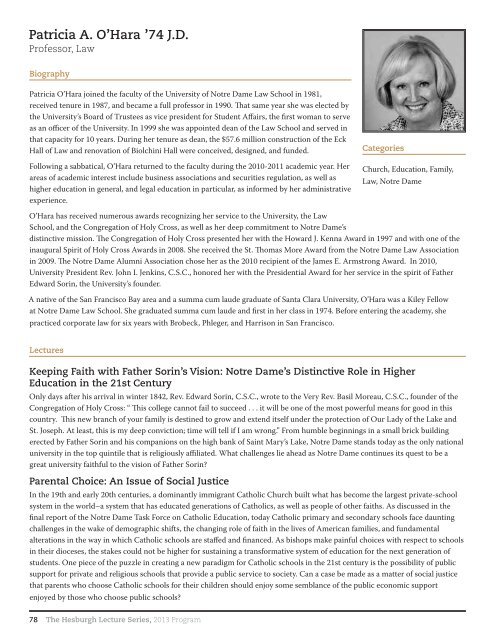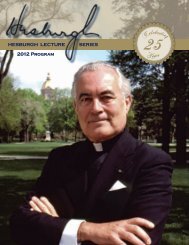HESBURGH LECTURE SERIES 2013 Program - Alumni Association ...
HESBURGH LECTURE SERIES 2013 Program - Alumni Association ...
HESBURGH LECTURE SERIES 2013 Program - Alumni Association ...
Create successful ePaper yourself
Turn your PDF publications into a flip-book with our unique Google optimized e-Paper software.
Patricia A. O’Hara ’74 J.D.<br />
Professor, Law<br />
Biography<br />
Patricia O’Hara joined the faculty of the University of Notre Dame Law School in 1981,<br />
received tenure in 1987, and became a full professor in 1990. That same year she was elected by<br />
the University’s Board of Trustees as vice president for Student Affairs, the first woman to serve<br />
as an officer of the University. In 1999 she was appointed dean of the Law School and served in<br />
that capacity for 10 years. During her tenure as dean, the $57.6 million construction of the Eck<br />
Hall of Law and renovation of Biolchini Hall were conceived, designed, and funded.<br />
Following a sabbatical, O’Hara returned to the faculty during the 2010-2011 academic year. Her<br />
areas of academic interest include business associations and securities regulation, as well as<br />
higher education in general, and legal education in particular, as informed by her administrative<br />
experience.<br />
O’Hara has received numerous awards recognizing her service to the University, the Law<br />
School, and the Congregation of Holy Cross, as well as her deep commitment to Notre Dame’s<br />
distinctive mission. The Congregation of Holy Cross presented her with the Howard J. Kenna Award in 1997 and with one of the<br />
inaugural Spirit of Holy Cross Awards in 2008. She received the St. Thomas More Award from the Notre Dame Law <strong>Association</strong><br />
in 2009. The Notre Dame <strong>Alumni</strong> <strong>Association</strong> chose her as the 2010 recipient of the James E. Armstrong Award. In 2010,<br />
University President Rev. John I. Jenkins, C.S.C., honored her with the Presidential Award for her service in the spirit of Father<br />
Edward Sorin, the University’s founder.<br />
A native of the San Francisco Bay area and a summa cum laude graduate of Santa Clara University, O’Hara was a Kiley Fellow<br />
at Notre Dame Law School. She graduated summa cum laude and first in her class in 1974. Before entering the academy, she<br />
practiced corporate law for six years with Brobeck, Phleger, and Harrison in San Francisco.<br />
Lectures<br />
Keeping Faith with Father Sorin’s Vision: Notre Dame’s Distinctive Role in Higher<br />
Education in the 21st Century<br />
Only days after his arrival in winter 1842, Rev. Edward Sorin, C.S.C., wrote to the Very Rev. Basil Moreau, C.S.C., founder of the<br />
Congregation of Holy Cross: “ This college cannot fail to succeed . . . it will be one of the most powerful means for good in this<br />
country. This new branch of your family is destined to grow and extend itself under the protection of Our Lady of the Lake and<br />
St. Joseph. At least, this is my deep conviction; time will tell if I am wrong.” From humble beginnings in a small brick building<br />
erected by Father Sorin and his companions on the high bank of Saint Mary’s Lake, Notre Dame stands today as the only national<br />
university in the top quintile that is religiously affiliated. What challenges lie ahead as Notre Dame continues its quest to be a<br />
great university faithful to the vision of Father Sorin?<br />
Parental Choice: An Issue of Social Justice<br />
In the 19th and early 20th centuries, a dominantly immigrant Catholic Church built what has become the largest private-school<br />
system in the world–a system that has educated generations of Catholics, as well as people of other faiths. As discussed in the<br />
final report of the Notre Dame Task Force on Catholic Education, today Catholic primary and secondary schools face daunting<br />
challenges in the wake of demographic shifts, the changing role of faith in the lives of American families, and fundamental<br />
alterations in the way in which Catholic schools are staffed and financed. As bishops make painful choices with respect to schools<br />
in their dioceses, the stakes could not be higher for sustaining a transformative system of education for the next generation of<br />
students. One piece of the puzzle in creating a new paradigm for Catholic schools in the 21st century is the possibility of public<br />
support for private and religious schools that provide a public service to society. Can a case be made as a matter of social justice<br />
that parents who choose Catholic schools for their children should enjoy some semblance of the public economic support<br />
enjoyed by those who choose public schools?<br />
78 The Hesburgh Lecture Series, <strong>2013</strong> <strong>Program</strong><br />
Categories<br />
Church, Education, Family,<br />
Law, Notre Dame



